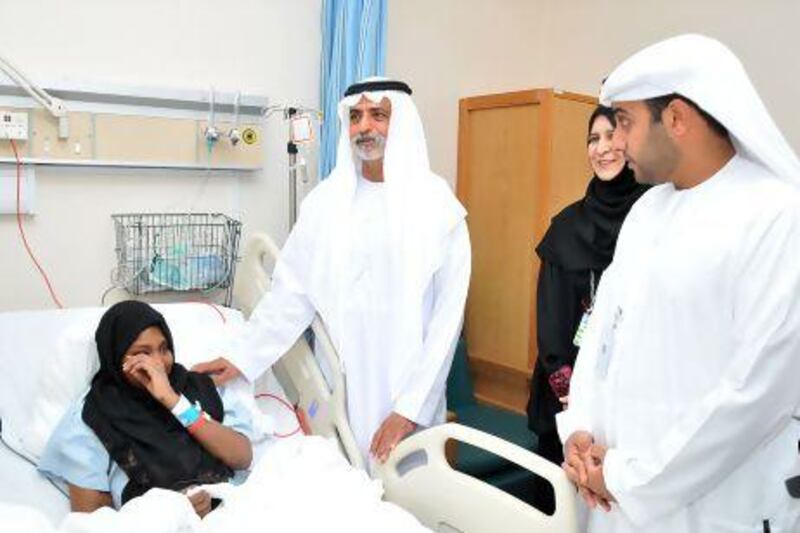ABU DHABI // Latifa Sai’ed says the first thing she will do when she leaves hospital tomorrow is have a beefburger.
The first patient in the UAE to have a transplant from a deceased donor, Latifa says her life will no longer be dictated by the dialysis machine that has sustained her failing kidneys since she was seven.
Now 23, she can eat and drink what she likes – and plan for a future.
"Before, every time I went to sleep, I never knew if I was going to wake up in the morning," says Latifa, who would have died without the transplant. "But now this has happened to me and, inshallah, everything is going to be OK."
On April 24, she received the phone call that changed her life.
A man was in a car crash in Saudi Arabia and was declared brain-dead. His grieving family donated his organs to help save other lives.
Latifa was deemed most in need of his kidney, after relying on dialysis since she was diagnosed with a rare kidney condition.
The medical team at Sheikh Khalifa Medical City told her to immediately travel from her Al Ain home to the Abu Dhabi city hospital.
"My mother, she was crying," Latifa says. "She was dreaming of this day a long time."
Arrangements were made to remove the organ and fly it from Saudi to the UAE. After being approved as a near-perfect tissue match, Latifa had the transplant the next day.
It was a success, and a first since the government recently cleared up confusion over a 1993 law. It now allows organ transplants from brain-dead donors.
Now, a little more than a week after the operation, she says her life has changed beyond recognition.
"I feel better than before by 100 times," Latifa says. "In these few days, I feel like I am not like before."
She has endured many medical problems associated with kidney failure, such as blood clots, inflammation and many painful procedures such as having a catheter fitted.
But the operation means she can now live like any other young woman.
"Before I had to go for dialysis three times a week, for maybe four hours," Latifa says. "You cannot live like normal people. It is really difficult.
"I am still young. I wanted to do things like drink coffee but I couldn’t. There was some food I could not eat at all."
She says she has a list of things she always wanted to do but never thought possible. Today, these are within her grasp.
"I think I will complete my studies, find a good job," Latifa says. "I will do many things that before I couldn’t do."
It is also the little things, she says, that will make the difference: being able to go shopping with friends and buy a dress without having to worry whether her catheter will be visible; not feeling the odd one out among her four brothers and sisters; and being able to eat a piece of chocolate without worrying if it will affect her health.
Under disclosure rules, she cannot get in contact with the family of the man whose kidney has given her a new lease of life. But she still has a message for them.
"I have to thank them," Latifa says. "They saved my life. It is a big gift. I feel like I am in a dream. I never thought that one day I would get a transplant kidney. I thought I would spend the rest of my life on dialysis.
"Now this kidney is part of my body and my life also."
Latifa says she is "very happy" about the clarification of the law. She has many friends who have also been dependent on dialysis for years. They, too, have a chance at a future.
"I say to them, if you dream of something, it will happen one day," she says.
"You know how many years I have been waiting for this moment? Well, it is here now."
jbell@thenational.ae





